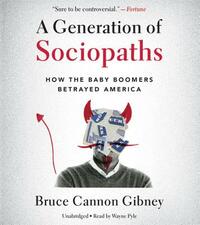You need to sign in or sign up before continuing.
Take a photo of a barcode or cover
205 reviews for:
A Generation of Sociopaths: How the Baby Boomers Betrayed America
Bruce Cannon Gibney
205 reviews for:
A Generation of Sociopaths: How the Baby Boomers Betrayed America
Bruce Cannon Gibney
informative
fast-paced
Had this going as an audiobook at 1.4x speed while I was multitasking. Sure, more than a few broad, problematic points but there were also points that had me going "pop off"
Beyond the sensational title, Gibney lays out convincing evidence that the fault for America's stagnant growth, poor education, and expanding debt and waistlines lies at the feet of the Worst Generation: The Boomers. Born into a world of great opportunity, they kept it all for themselves. Their parents paid all the bills and, once The Greatest Generation died off, Boomer children now foot the bill.
As they took power in government, their selfishness meant that government policies were made and adjusted to ensure their own (social) security at the expense of anyone else -- especially those who will be stuck on this planet they fucked-up after they finally have the decency to die. Taxes have not been reduced overall as much as re-allocated to non-Boomers. They value "feelings" over logic while fast to hypocritically discount anyone who "feels" differently than they do. Hypocrisy reigns supreme for the Boomer, like those with boners for our Founding Fathers who ignore the fact that Thomas Jefferson wrote that it is "incumbent on every generation to pay its own debts as it goes." The bloated debt-filled corpse of the Boomer will rot and stink up this country for years to come.
This book is an exercise in frustration. Page after page of well-researched documented evidence on how the Boomers have fucked up everything from infrastructure to the tax code to the education system. Boomers, as a whole, eschew anything that interferes with their immediate gratification. They're lazy, stupid (the number who believe that the earth revolves around the sun is startling), irresponsible (one of the highest STD rates of any generation), hypocritical, and selfish. The uber-Boomer, Donald Trump, is now in charge, which does not bode well in case you haven't figured that out yet.
Gibney makes clear that the vices and virtues of a generation do not apply to everyone in it. But I've already seen a few #notallboomers! reviews here on Goodreads. By making this comment, these people are spouting their opinion -- their FEELINGS -- on something they either a) did not read or b) did not pay attention to, which in fact puts them in the same sociopathic strata as their peers.
In the end, Gibney provides "solutions" which pretty much boil down to this: never vote for a Boomer again. Remove them from power. Reduce social security and tax breaks that almost specifically benefit this generation, forcing them to repay the debts they've accumulated for their entire lives. But, like most things these days, it feels hopeless.
The book is readable but filled with cold, hard facts. Many of the numbers, budgeting, and financial statistics made my eyes glaze over. "Raised" by Boomers, I don't know how to manage money either.
Regarding the "sociopath" label, I think that's an inflammatory term used to get the book some attention. I'm not sure how accurate it is, and with my general disdain for the science of psychology (how much of the current qualifications for "sociopath" were formulated by Boomer psychologists?) I don't care. They're definitely short-sighted, antisocial, and self-destructive, which is more than enough condemnation for me.
Frankly, I have a bit of confirmation bias with this one. As you might infer from the sarcastic quotes around "raised," my parents were, um, less than stellar, and I could check off almost every sociological trait outlined by the DSM-V with either of them. When watching Trump "debate" my most common comment was, "It's like having a conversation with my mother."
Because of my personal history, I found myself more interested in the causes than the effects. What made the Boomers this way? Gibney dissects this in an early chapter, boiling it down to television. He writes, "TV's essential characteristics make it the perfect education for sociopaths, facilitating deceit, acquisitiveness, intransigence, and validating a worldview only loosely tethered to reality." It's a strong point, although Gibney isn't bold enough to draw the line from TV to capitalism, the world's truest evil, perhaps because the American dollar has treated him so well. As a rich Silicon Valley libertarian, Gibney is part of the group who will likely replace the Boomers as the next generation to totally fuck us all up.
As they took power in government, their selfishness meant that government policies were made and adjusted to ensure their own (social) security at the expense of anyone else -- especially those who will be stuck on this planet they fucked-up after they finally have the decency to die. Taxes have not been reduced overall as much as re-allocated to non-Boomers. They value "feelings" over logic while fast to hypocritically discount anyone who "feels" differently than they do. Hypocrisy reigns supreme for the Boomer, like those with boners for our Founding Fathers who ignore the fact that Thomas Jefferson wrote that it is "incumbent on every generation to pay its own debts as it goes." The bloated debt-filled corpse of the Boomer will rot and stink up this country for years to come.
This book is an exercise in frustration. Page after page of well-researched documented evidence on how the Boomers have fucked up everything from infrastructure to the tax code to the education system. Boomers, as a whole, eschew anything that interferes with their immediate gratification. They're lazy, stupid (the number who believe that the earth revolves around the sun is startling), irresponsible (one of the highest STD rates of any generation), hypocritical, and selfish. The uber-Boomer, Donald Trump, is now in charge, which does not bode well in case you haven't figured that out yet.
Gibney makes clear that the vices and virtues of a generation do not apply to everyone in it. But I've already seen a few #notallboomers! reviews here on Goodreads. By making this comment, these people are spouting their opinion -- their FEELINGS -- on something they either a) did not read or b) did not pay attention to, which in fact puts them in the same sociopathic strata as their peers.
In the end, Gibney provides "solutions" which pretty much boil down to this: never vote for a Boomer again. Remove them from power. Reduce social security and tax breaks that almost specifically benefit this generation, forcing them to repay the debts they've accumulated for their entire lives. But, like most things these days, it feels hopeless.
The book is readable but filled with cold, hard facts. Many of the numbers, budgeting, and financial statistics made my eyes glaze over. "Raised" by Boomers, I don't know how to manage money either.
Regarding the "sociopath" label, I think that's an inflammatory term used to get the book some attention. I'm not sure how accurate it is, and with my general disdain for the science of psychology (how much of the current qualifications for "sociopath" were formulated by Boomer psychologists?) I don't care. They're definitely short-sighted, antisocial, and self-destructive, which is more than enough condemnation for me.
Frankly, I have a bit of confirmation bias with this one. As you might infer from the sarcastic quotes around "raised," my parents were, um, less than stellar, and I could check off almost every sociological trait outlined by the DSM-V with either of them. When watching Trump "debate" my most common comment was, "It's like having a conversation with my mother."
Because of my personal history, I found myself more interested in the causes than the effects. What made the Boomers this way? Gibney dissects this in an early chapter, boiling it down to television. He writes, "TV's essential characteristics make it the perfect education for sociopaths, facilitating deceit, acquisitiveness, intransigence, and validating a worldview only loosely tethered to reality." It's a strong point, although Gibney isn't bold enough to draw the line from TV to capitalism, the world's truest evil, perhaps because the American dollar has treated him so well. As a rich Silicon Valley libertarian, Gibney is part of the group who will likely replace the Boomers as the next generation to totally fuck us all up.
informative
reflective
slow-paced
informative
slow-paced
I agree that a lot of the issues the U.S is facing today is because of boomers. For example, the environment. But not all boomers are sociopaths. There are a lot who cares about the U.S and want to make it better.
The other problem I have with the author is that being a rich man, he didn't hold the rich responsible for anything. He let those rich welfare queens off the hook.
The other problem I have with the author is that being a rich man, he didn't hold the rich responsible for anything. He let those rich welfare queens off the hook.
dark
informative
tense
medium-paced
Wow, this was rough to listen to. A lot of good information and definitely damning. Hard to see hope for the future while reading and after finishing.
informative
I confess, I was attracted by the title, it being pure rage bait for someone so frustrated by the Boomer leadership of the country as late. And I was heartened by Gibney's introduction which seemed to promise an even-handed and academic look at the development of Boomers and their subsequent impact on history. Surely calling them sociopaths was a clever bit of marketing, right? Well, nope. Gibney proceeds to try, very mightily, to proffer a literal diagnosis of sociopathy on an entire generation, engaging in preposterous rhetorical stretches that range from the amusingly novel to sloppily counterfactual. This book could have been a great read if perhaps written by a sociologist and/or economist who could provide more scientific rigor, but as it is it reads solely as a marketing play to angry Millennials. I'm surprised Hachette released it, frankly.





